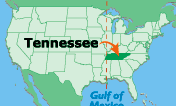(Tennessee is the fifth state in our series of featured IFPS programs. See more at State Profiles.)
Tennessee was one of the first states to implement IFPS statewide. After discontinuing IFPS for a time, Tennessee is now again considering statewide implementation. All eyes are on a federally-funded pilot project that is testing IFPS with families involved in substance abuse. The project is also a collaborative that includes mental health, substance abuse, and child welfare.
1. How long has your state offered IFPS? Share about the history of IFPS in your state.
Ours is a partnership of a state mental health and substance abuse authority, state child welfare, community-based mental health center, and nonprofit research organization. The partnership began in 2012 when we applied for a collaborative grant with the Administration for Children and Families.
2. Why does your state/agency offer IFPS?
We had previous experience with IFPS as a statewide service designed to keep children safely and successfully in their homes rather than in state custody. A grant opportunity became available that allowed us to test the IFPS model on a smaller scale and evaluate its efficiency in families where parental substance abuse is an issue.
3. What qualities do you want to see in providers of IFPS, both at the agency and at the therapist level?
We look for a culturally competent team of master’s level clinical staff that is comfortable being family focused and values “family” as a necessary contributor to children’s wellbeing. Staff must be open to IFPS values and competencies, and have a passion for direct service delivery. Keeping children safe and making a positive difference for them and their families must be staff’s top priority.
4. What qualities do you look for in an IFPS therapist?
The data have shown that families are more hopeful after experiencing IFPS. There is some decay after six to 12 months, but families still remain more hopeful than at baseline. Families indicate appreciation to their therapist for new skills and connections. Families also report a more positive attitude around child welfare since IFPS.
5. How do you measure success of IFPS services? How successful are IFPS services in your state?
We examine the extent to which we have been able to reduce entry into custody, as well as re-entry reductions for re-unification cases. We are further collecting data on increased social and emotional development of children and families using the North Carolina Family Assessment Scales.
6. What advice and resources can you share with other states that want to establish a strong IFPS program?
Contact the National Family Preservation Network (NFPN) for guidance. They will work with you in determining how to establish a strong IFPS program. Their IFPS Toolkit, available on the NFPN website, is also very useful, as are other site resources.
Contact:
Dr. Edwina Chappell
Principal Investigator
TIES Project
_______________
Posted by Priscilla Martens, Executive Director, National Family Preservation Network

